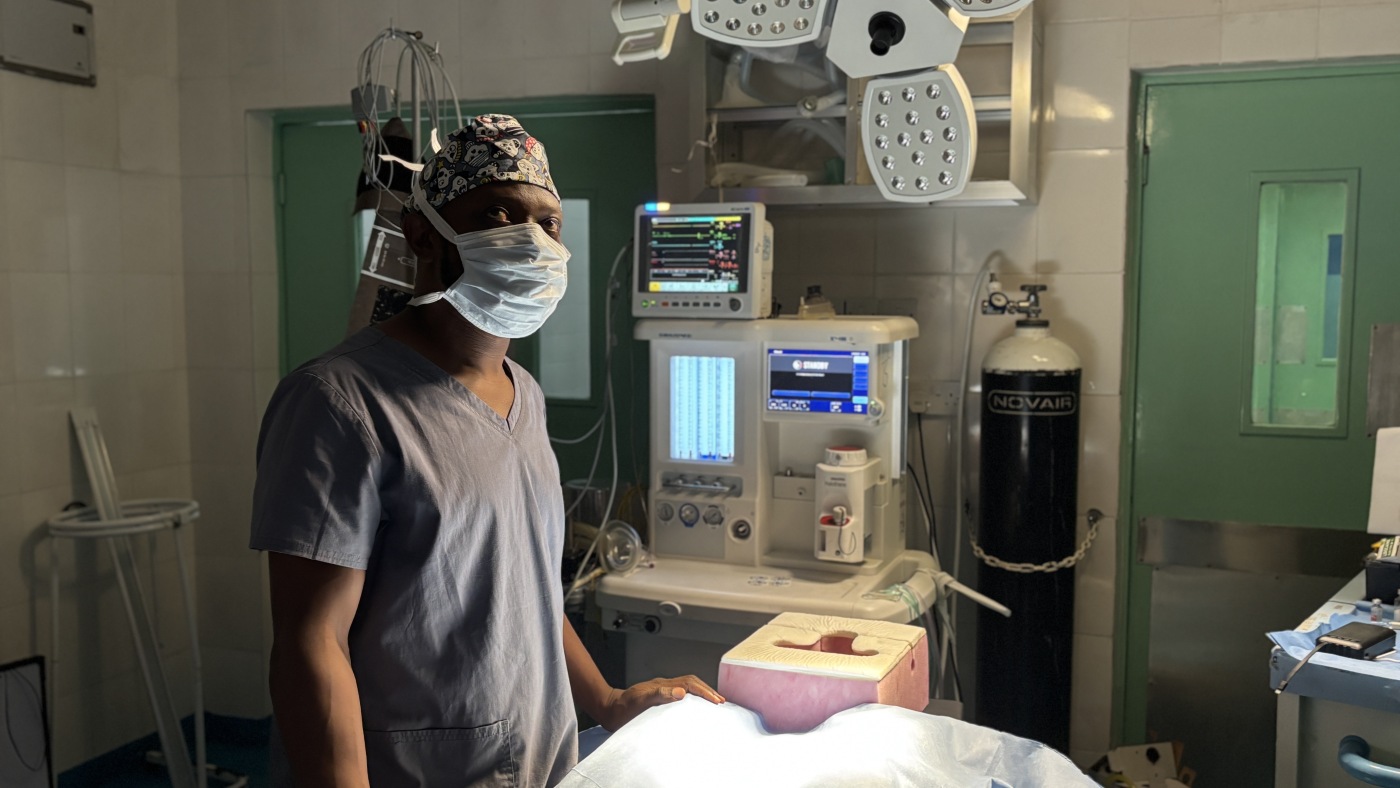Morie Abibu, a 56-year-old man from Sierra Leone, recently underwent a groundbreaking neurosurgical procedure that could change the landscape of healthcare in his country. Abibu, paralyzed from the neck down due to a mass pressing against his spinal cord, had been slowly suffocating. His condition required urgent neurosurgery, which had previously been unavailable in Sierra Leone until the arrival of Dr. Alieu Kamara, the nation’s first and only neurosurgeon.
For years, individuals needing neurosurgical interventions in Sierra Leone faced grim outcomes. Dr. Marco Lee, former president of the Western Neurosurgical Society, emphasized the dire nature of Abibu’s situation, stating, “Without it, he will have a devastating end of life.” Prior to Kamara’s practice, patients like Abibu had little hope, often facing death or severe disability due to a lack of surgical options.
Since starting his practice in January 2025, Kamara has been shouldering the neurosurgical needs of a population of eight million, managing cases that range from traumatic injuries to brain tumors. Dr. Kehinde Oluwadiya, acting chief medical director at the University of Sierra Leone Teaching Hospital Complex, remarked, “If you are lucky and rich, you will go to another country and be treated. But if you are not, it’s either you die or you live with a lot of disability.”
Historic Surgery Amid Challenging Conditions
Five months after Kamara began his practice, April Sabangan, CEO of Mission Brain, visited Connaught Hospital to support the nascent neurosurgical service. During her visit, Abibu became one of the first patients to benefit from this vital care. The surgical team at Connaught consisted of Kamara, who was the sole neurosurgeon, along with two surgeons from Stanford—Dr. Seunggu Han and Dr. Silvia Vaca—who provided valuable assistance.
The operating room, however, presented its own set of challenges. Resources were scarce, and the team had to improvise support structures for Abibu using surgical gowns and masking tape. As Kamara made the initial incision, the power went out. Frequent power outages are common in Sierra Leone, especially during the rainy season. Only the small battery-powered surgical lights brought by the team allowed them to continue.
Vaca leaned in closer to illuminate the surgical site while Kamara skillfully navigated the delicate procedure. After an intense hour and a half, he extracted a piece of bone affected by the tumor. The atmosphere was tense as the lights flickered back to life, only to fail again multiple times during the surgery. Finally, after three hours, they completed the operation—the first-ever spine surgery performed in Sierra Leone.
A Personal Journey Fueled by Determination
Dr. Kamara’s journey to becoming Sierra Leone’s first neurosurgeon is as compelling as the surgeries he now performs. Born in a small village, he endured the hardships of an 11-year civil war, which shaped his desire to help others. After witnessing a friend’s injury during a soccer game, Kamara resolved to become a doctor.
Despite financial obstacles, he pursued a scholarship to study medicine in Jilin, China, where he spent twelve years obtaining both an MD and a Ph.D. in orthopedic surgery. Upon returning to Sierra Leone in 2020, he realized the dire need for neurosurgical care, as patients with head and spinal injuries often had to be treated under orthopedic care—a system that proved inadequate.
The push to establish a neurosurgery program in Sierra Leone took on a grassroots dimension. In 2021, Fatu Conteh, a neurosurgery resident in California, faced a personal crisis when her grandmother suffered a stroke during a visit. This experience fueled her determination to prevent similar situations for others. Working alongside Dr. Sonia Spencer, chairperson of the hospital complex, Conteh sought partnerships to bring neurosurgery to Sierra Leone.
By 2023, significant progress was made when Conteh connected with Dr. Kee Park, co-chair of the Global Neurosurgery Committee, who facilitated introductions to international neurosurgeons and organizations. Sabangan’s involvement through Mission Brain became crucial, as the organization aimed to enhance global neurosurgical access. This collaboration led to Kamara receiving specialized training and the establishment of necessary infrastructure.
Hope and Challenges Ahead
Following his surgery, Abibu’s recovery has been met with optimism. Six hours post-operation, Kamara asked him to try moving his toes. To everyone’s astonishment, Abibu was able to flex his left foot slightly, a sign of hope and recovery. “For a patient paralyzed for months to move their toes just six hours after surgery is almost unheard of. It’s a miracle,” said Vaca, holding back tears.
Nevertheless, significant challenges persist in Sierra Leone’s healthcare system. With limited supplies of essential medical items like IV fluids and bandages, patients face the risk of complications after surgery. The hospital’s imaging capabilities are also inadequate, making post-operative monitoring difficult. Abibu’s family had to borrow $300—a substantial sum relative to local incomes—to cover his treatment costs.
Despite these hurdles, Kamara and Connaught Hospital are committed to improving healthcare access. The government is exploring the development of a dedicated neurosurgery ward, and plans are underway to procure a CT scanner for the facility. Already, 24 nurses have been trained in neurotrauma patient management with the help of Mission Brain.
Reflecting on the potential impact of this initiative, Dr. Mustapha Kabba, the deputy chief medical officer of the Ministry of Health, stated, “I see this as a litmus test for what is possible in the health sector.” Kamara aims to inspire a new generation of medical professionals through his work, emphasizing the importance of building a self-sufficient neurosurgical program.
As he continues to operate, Kamara remains dedicated to his patients, making himself available around the clock to ensure their care. “I work around the clock. I work seven days a week. I have to follow up on patients,” he said. His vision for the future is clear: to establish a sustainable neurosurgery program that serves the people of Sierra Leone effectively.
